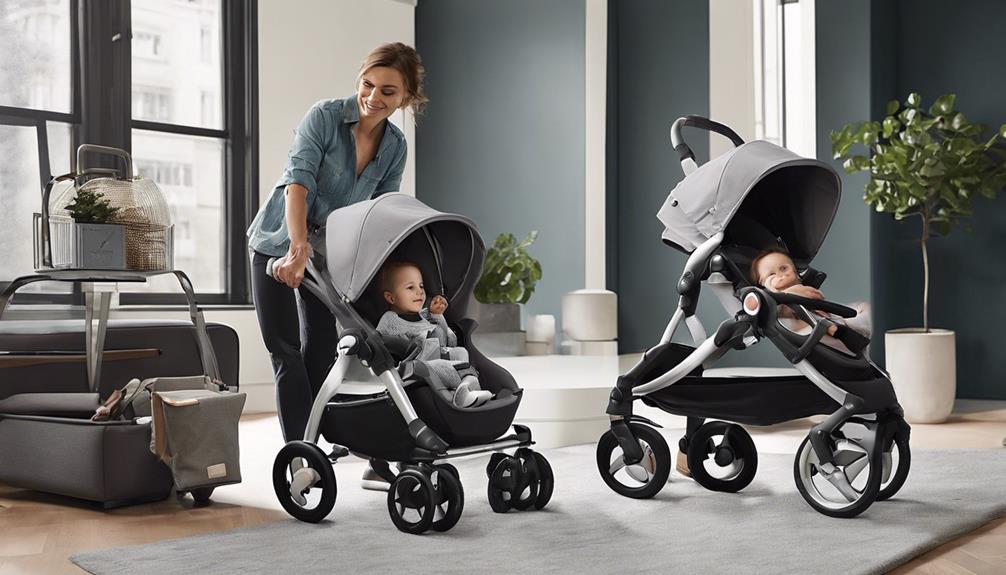When your newborn has hiccups, it can be alarming, but there's no need to panic. Understanding why hiccups happen and knowing how to address them is important for every parent.
You may have tried a few remedies, but have you considered the surprising connection between hiccups and feeding patterns? Let's explore this further to help you navigate through this common yet puzzling newborn phenomenon.
Key Takeaways
- Newborn hiccups are normal for brain and nervous system development.
- Burp your baby to release trapped air and prevent overfeeding.
- Hold baby upright after feeding to aid digestion and reduce hiccups.
- Consult a doctor if hiccups persist or cause discomfort.
Understanding Newborn Hiccups
Understanding newborn hiccups is essential for you as a parent to grasp the significance and potential benefits of this common occurrence in your infant's early development. Newborn hiccups, while frequent, are typically vital and actually signify positive signs of your baby's growth. These hiccups are part of a normal reflex pathway development, indicating the maturation of your baby's brain and nervous system.
The causes of newborn hiccups can vary, from swallowing air to temperature changes or stress. However, regardless of the trigger, these hiccups play an important role in helping your baby's diaphragm strengthen, regulating their breathing, and fostering self-regulation. As your baby grows, you may notice a decrease in the frequency of hiccups, which is entirely normal and aligns with their overall development.
Embrace these moments of hiccups as they contribute to your baby's well-being and show that their body is adapting and growing as expected.
Causes of Baby Hiccups

As a parent, you may wonder about the various factors that can trigger hiccups in your baby, such as spasms in the developing diaphragm. These hiccups, although common and harmless, can be concerning. Here are some key causes to take into account:
- Overfeeding: Feeding your baby too much can lead to hiccups as their tiny stomachs may struggle to handle a large volume of milk or formula.
- Swallowing Air: Babies often gulp air while feeding, especially during bottle feeds, which can result in hiccups.
- Stomach Distention: When babies overeat or feed too quickly, their stomachs can become distended, triggering hiccups.
- GERD: Gastroesophageal reflux disease, a condition where stomach acid flows back into the esophagus, may contribute to frequent hiccups in babies.
Understanding these triggers can help you navigate your baby's hiccups better. Remember, most baby hiccups will naturally resolve on their own without intervention.
Alleviating Baby Hiccups

To soothe your baby's hiccups, try burping them during and after feedings as a simple yet effective way to alleviate discomfort. This gentle technique helps release any trapped air that could be causing the hiccups.
Offering smaller amounts of milk more frequently can prevent overfeeding, which is a common trigger for hiccups in babies. After feeding, hold your little one upright for about 20-30 minutes to aid in digestion and reduce the chances of hiccups occurring.
If hiccups persist, gently rub your baby's back to provide additional comfort and help ease the hiccups. Ensuring proper feeding techniques, like a proper latch and using the correct nipple size, can also play a significant role in preventing hiccups in newborns.
Preventing Infant Hiccups

Frequent burping during and after feeds is a key strategy to help prevent infant hiccups by releasing trapped air. Here are some tips to prevent those pesky hiccups in your little one:
- Feeding Position: Hold your baby upright while feeding to reduce the intake of air, which can contribute to hiccups.
- Smaller Feedings: Offer smaller, more frequent feedings to prevent overeating, a common trigger for baby hiccups.
- Ensure a Good Latch: Make sure a good latch during breastfeeding or choose the right bottle nipple size to reduce air intake and minimize hiccups.
- Calm and Relaxed Environment: Keep your baby calm and relaxed during feedings to avoid stress and excitement that may lead to hiccups.
Seeking Medical Advice

If your newborn's hiccups persist for an extended period or seem to cause discomfort, it's important to seek medical advice promptly. While hiccups in babies are common and often harmless, persistent hiccups that disrupt feeding or sleep patterns may indicate an underlying issue.
If your baby experiences hiccups during feeding or appears distressed by them, consulting a doctor is advisable. Keep an eye out for identifiable causes such as hiccups lasting for hours, followed by vomiting, fever, or unusual behavior.
When seeking medical advice, describe the frequency and duration of the hiccups, any accompanying symptoms, and how your baby responds to them. A healthcare provider can assess if there are any concerns related to the vocal cords or diaphragm causing the hiccups.
Frequently Asked Questions
Is It OK to Lay Baby Down With Hiccups?
Yes, it's safe to lay your baby down with hiccups. Hiccups don't impact their breathing or pose a risk. Just make sure they're comfortable and secure. If hiccups persist or cause distress, consult a pediatrician for guidance.
How Should I Hold My Baby When She Has Hiccups?
When your baby has hiccups, hold them close against your chest and gently pat or rub their back. Keeping them upright helps ease hiccups and prevents discomfort. Stay calm and provide reassurance for your little one.
How Do I Scare My Baby off Hiccups?
When your baby's hiccupping, try gentle surprises like a soft puff of air on their face or a pacifier. Singing or changing positions can distract them. Think of it like waving a magic wand to banish those hiccups!
How Do You Get Rid of Hiccups in Adults Newborn?
When your newborn has hiccups, try burping gently, changing their position, and taking short feeding breaks. Engage in soothing activities and guarantee a comfortable environment. If hiccups persist, consult a healthcare provider for further guidance.
Conclusion
If your newborn is experiencing hiccups, remember that it's a common and natural occurrence. By using simple techniques like burping and proper feeding, you can help alleviate and prevent hiccups.
Did you know that 70% of newborns experience hiccups in their first few months of life? Trust your instincts, but don't hesitate to seek medical advice if needed for reassurance and guidance. Your baby's well-being is always a top priority.









